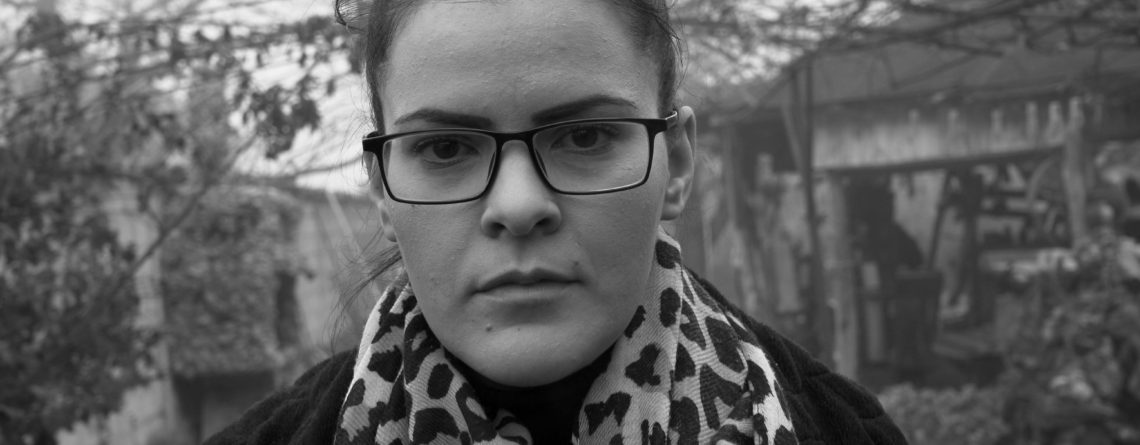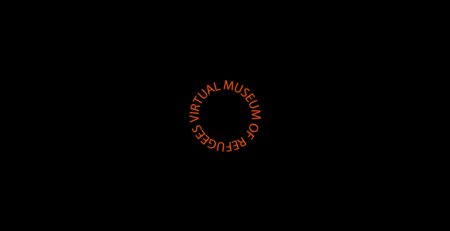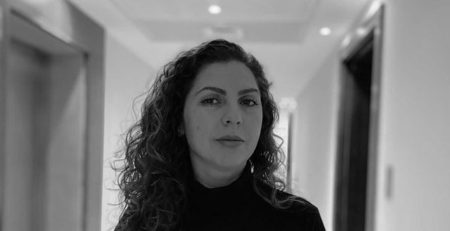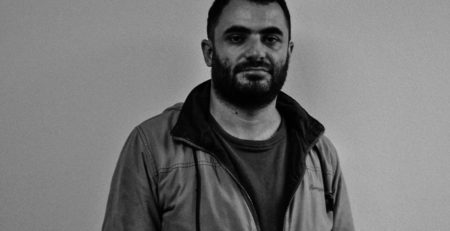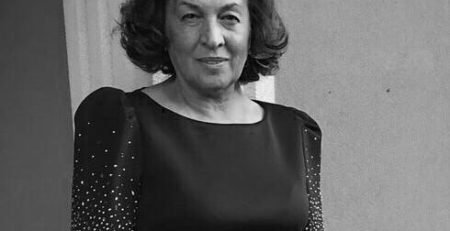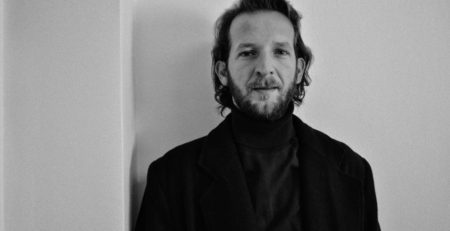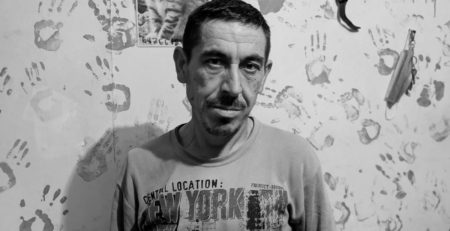Sabernete Nuraj
Bjeshka Guri (osoba koja intervjuiše)
Sabernete Nuraj (sagovornik)
Skracenice: BG=Bjeshka Guri, SN= Sabernete Nuraj
BG: Možete li mi reći nešto o sebi?
SN: Da, ja sam Sabernete Nuraj- Ćuni. Tokom rata bila sam sa majkom, kod kuće sam imala oca, mlađu sestru, brata i baku, tu su bili i braća od stričeva i stričeva ćerka, a stric je bio u OVK.
Srbi su dolazili, kontrolisali su nas i nisu nas prisiljavali, ali bilo je straha jer bili smo deca, plašiili smo se da se nešto ne dogodi.
Bili smo jako uplašeni, hvala Bogu nismo imali ništa opasno u kući, nisu nam ništa uradili, nakon izvesnog vremena počelo je bombardovanje, pucnjava, hapšenja ljudi po selu jednom i nakon nekog vremena doneta je odluka da napustimo selo Racaj. Krenuli smo put Albanije.
BG: Pre rata, da li se sećate manje-više kakvi su bili vaši utisci pre početka rata, kako ste se osećali?
SN: Pre rata imala sam 8 godina, a moj otac je izašao da se bori, jer tu i tamo su započele borbe, ali u nekim mestima Srbi su tražili ljude po selu da ih da odvedu.
Bila sam dete, majka je pokušala da nas smiri na svoj način, da ih se ne plašimo, ali ispalo je tako i u celoj zemlji je počeo rat na više mesta i nakon nekog vremena morali smo da napustimo svoje mesto, kuće i krenuli smo put Albanije.
U Bištažu je bilo mnogo Srba i u kolima, pucali su, granatirali.
BG: A sa čime ste prešli granicu, sa čim ste krenuli?
SN: Nismo prešli granicu, u selu Bištažin u tamošnjem selu u blizini, odveli su nas traktorom, jer mi nismo imali svoj traktor, odveli su nas iz sela, a u Bištažinu su nas bombardovali, u tom trenutku ništa nisam znala, samo tama, tama koju sam videla.
A kada sam došla sebi videla sam katastrofu, nisam mogala da vidim majku, brata ili sestru, tražila sam ih..nikoga. Ljudi su gorelili, bombe su ih pogodile.
Jedina sam bila ja u svesnom stanju tamo, želela sam da vidim svoju majku gde je. Kada sam je uvidela, bila je velika sreća, bila je u veoma lošem stanju, videla sam brata, jer dosta su bili povređeni, uzela sam mlađu sestru, pokušavala sam da je smirim jer je plakala, imala je 11 meseci. Onda je stigla hitna pomoć iz Đakovice, odveli su nas i u bolnicu smo boravili dok trenutka kada se Kosovo oslobodilo, u Đakovici.
Taj trenutak kada je odluka doneta da NATO trupe uđu, za mene je to bila radost koju ne mogu ni rečima da opišem kakva je to radost bila, moja majka je bila mnogo bolesna, bila je u komi 3 dana, 24 ljudi je tu umrlo, 15 je spašeno sa mnogo povreda, ja sam bila malo jača od ostalih, ali drugi su bili veoma povređeni.
I dalje, evo već 21 godinu pati od rana, rane nastale od bombaških napada.
BG: Da li se neko brinuo o tim ljudima nakon rata?
SN: Posle rata moram reći NE, nikome nije bilo stalo da dođe i pita, čak su mi rekli ne znamo šta da radimo sa vama, ili da dobiju neku informaciju. Svi oni koji su tu poginuli, imali su decu, žene, muževe, bilo je samo socijalne pomoći koju smo dobili, i bilo je one pomoći koju nisu uopšte dobili a trebali su, jer majka nije mogla da hoda, cela leđa su joj bila povređena, i dalje su, sve su same povrede.
U selu ima mnogo drugih koji su bili u jednom traktoru, tu je žena bez jednog oka, ne vidi, sopstvenim sredstvima ide se u Italiju da bi se brinulo o njoj, o sebi.
Imam sestru, ona takođe ima geler na glavi, nikome nije stalo do njih, ja imam nekoliko sitnih komada po telu, ali nemam ih mnogo, nisu opasni.
Majka mi je bila u veoma lošem stanju, osim bolnice koja se o nama brinula 5 meseci, jer smo imali članove porodice koji su nam mnogo pomogli. Posle tog vremena kada smo izašli iz bolnice, niko se nije zainteresovao za nas.
BG: Iako se dogodilo da je majka lekar u bolnici, da li ste ostali na Kosovu?
SN: Da, da na Kosovu, čim smo izašli iz bolnice nakon oslobođenja Kosova, došao je moj ujak i odveo nas, ostali smo kod mog ujaka neko vreme dok nam nisu napravili kuću, napravili su jednospratnu kuću za život.
BG: A zašto je kuća izgorela?
SN: Da, kuća je u potpunsti izgorela. Iz pomoći su nam napravili dvosobnu kuću, koliko da bi živeli, čak i tada je moj otac bio veoma tužan, vratio se iz inostranstva ovde, i tako smo morali da živimo svakodnevno, ali moja majka imala rane na telu, trebalo je mnogo novca da bi se brinulo o njoj, da joj se pomogne jer je bila mnogo loše.
BG: Da li ste ostali u bolnici dok Kosovo nije oslobođeno?
SN: Da, da, ostali smo u bolnici 5 i po meseci.
BG: Kako ste stigli tamo?
SN: Prošli smo, kako da vam kažem, nismo imali problema od Srba, osim nekoliko dana pre nego što je doneta odluka da se dođe u Đakovici, Srbi su doneli odluku koja je govorila da će doći do velikog masakra, biće gore nego u Srebrenici, a tih dana sam se jako plašila, govorila sam kako da mogu da vidim sestru ili brata od strica i majku, šta znam šta će nam uraditi.
Bilo me je strah, ali molili smo se za to da uđe NATO i da nas oslobodi, ali nikada neću zaboraviti taj dan, nikada nisam osećala veću radost, niti ću je više ikada imati.
Za sve je to bila radost, ne samo za mene, već i za celu državu, za lekare, bilo je i mnogo povređenih. Bilo je žena koje nisu imale ni iglu, gde da idu, nisu imale kuće, bile su jako loše.
Ali ovako nisu nas Srbi maltretirali, nisu nam ništa rekli, samo onih nekoliko nedelja pre ulaska u NATO, to su bile one reči koje smo čuli od Srba i kojih smo se jako plašili.
BG: Kako je to prošlo dalje, da li se sećate trenutka kada ste se vratili kući?
SN: Sećam se, čim smo izašli iz bolnice, dugo smo ostali kod ujaka, ostali smo tamo dok nam nisu kuću napravili. Boravili smo i kod strica kratko, kojem je kuća bila izgorela. Tamo smo se zadržali kratko i sve je bili usmereno da se majka izleči, jer svako ko je video tako nepokretnu za nas je bilo mnogo loše.
Onda su nam napravili kuću i otišli smo kući. Tada smo se trudili prema našim uslovima, ali pomoći od nigde.
BG: kako mislite da je rat uticao na vas lično, da li se često sećate?
SN: Sećam se, sećam se vrlo često i nakon rata, nakon što sam malo odrasla, shvatila sam da imam veliku nervozu, bilo je mnogo nervoze jer nije moglo ništa da se učini.
Kad smo otišli do mesta gde smo granatirani, u Bištažinu, odlazak je bio neka vrsta traume, kada odem tamo i samo kada zatvorim oči, sve što se preživelo pojavljuje se kao prvog dana.
Bila sam toliko zatvorena, da mi je srce želelo da pukne, jer sam bila veoma uznemirena.
Imala sam 9 meseci, oprostite 9 godina, videla sam mnogo -mnogo lošeg sam videla. Ne znam, ponekad pomislim kako sam tako dobro kad me vidi neko, toliko sam strašna. Možeš da pretrpiš veliku traumu i boli, ali ja sam imala toliko traume tako da kad bi zatvorila oči, pomislila bi da sam mnogo uznemirena, ali svaki put kada sam pokušala da uklonim traumu od sebe, ne možeš ništa time postići.
Da, pokušavala sam čak i da se borim i ovako, jer niko nije došao da nam pomogne, čak ni onima koji su svoj život dali za ovu zemlju to ne bi smelo da se zaboravi.
BG: Da li ste konsultovali ili ste se konsultovali sa nekom drugom osobom, lekarom ili psihologom vezano za bilo kakvu psihološku pomoć?
SN: Bila sam, bila sam, malo su mi pomogli razgovorom, bio je jedan lekar koji mi je pomogao, da uznemirenost ne primam k srcu koliko je to moguće, ali sve je nekako za one ljude koji su poginuli i da se država ne brine o njima, ili da pruži neko obrazloženje, a ne opravdanje, neku istorijsku priču, nešto, ili da razgovaraju ili da se zainteresuju.
Muškarci i žene su poginuli, tamo nije bilo dece, plačem jer me to najviše muči, nikog to nije interesovalo, ni samu državu.
Shvatila sam da nemam šta da radim, treba čovek da se pomiri s tim, ali njihove date živote ne smemo zaboraviti.
BG: Pre nego što završim, da li imate nešto da dodate?
SN: Ne, puno hvala svima vama koji ste zainteresovani i ako Bog da, Bog će vam to vratiti dobrim stvarima, puno ste učinili da se ova istorija ne izgubi.
Puno vam hvala.

